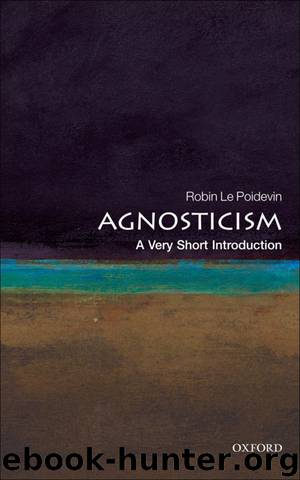Agnosticism: A Very Short Introduction by Robin Le Poidevin

Author:Robin Le Poidevin
Language: eng
Format: epub
Publisher: OUP Oxford
Published: 2010-03-17T04:00:00+00:00
So even if we are not apparently being observed by any human onlooker when we act as we should or shouldn’t, or just contemplate doing so, it feels as if we are being observed and judged, and we experience the associated pride or shame. Why would we do this unless there really were such a being observing and judging us, and communicating that judgement to us? For Newman, God is the inescapable conclusion. But let us put the point more modestly and say that the phenomenon of conscience shifts the probabilities somewhat in favour of theism.
But does it? There is an alternative explanation of the source of conscience, and that is that it is the result of both positive and negative conditioning, in which good actions are rewarded and bad ones punished, making us anxious or fearful at the mere thought of performing or avoiding certain actions. We experience approbation and disapprobation when we are at a very young and impressionable age and we internalize these judgements. When we act, it is as if we are being watched by a parent or by someone who has authority over us, because those were exactly the conditions under which we took our first steps towards understanding right and wrong. There is an ineradicable association between act and judgement, so that the performance or contemplation of the former leads inexorably to the expectation of the latter. God, it might be argued, needn’t come into it.
That may seem plausible enough, but it cannot be the whole story. The actual experiences we had when young don’t seem enough to explain the all-pervasiveness of conscience. Sometimes we did bad things and got away with them; sometimes we did good things and no-one knew. Sometimes we were unjustly punished or unfairly rewarded. Those meting out the judgement may themselves have been morally flawed. And our conscience is stirred by actions we perform as adults that have no counterpart in our childhood experience: how could blind associations generalize in this way? Moreover, this ‘conditioned fear response’ approach to conscience doesn’t explain the peculiarly moral sense. We feel embarrassment and shame over many things we do that have no specifically moral content: our lame performance on sports day at school may have led to howls of execration, the shame of which we continue to feel for many years afterwards. But that hardly amounts to a bad conscience. The thought of speaking in public or appearing in certain forms of dress may evoke strong anxiety or embarrassment, but no moral sensations. So what aspect of conditioning explains the moral dimension of our emotions?
We could try supplementing the social conditioning account by one that sees conscience as the legacy of both biological and social evolution over millennia, in which dispositions to certain kinds of behaviour – generally, those that contribute to greater social cohesion – are selected for at the expense of those that are damaging to social groups. Essentially, those who have a hard-wired capacity for moral conscience are, other things being equal, more likely to pass on their genes than those who do not.
Download
This site does not store any files on its server. We only index and link to content provided by other sites. Please contact the content providers to delete copyright contents if any and email us, we'll remove relevant links or contents immediately.
The Lost Art of Listening by Michael P. Nichols(6472)
Why I Am Not A Calvinist by Dr. Peter S. Ruckman(3770)
The Rosicrucians by Christopher McIntosh(3049)
Wicca: a guide for the solitary practitioner by Scott Cunningham(2704)
Signature in the Cell: DNA and the Evidence for Intelligent Design by Stephen C. Meyer(2501)
Real Sex by Lauren F. Winner(2474)
The Holy Spirit by Billy Graham(2417)
To Light a Sacred Flame by Silver RavenWolf(2353)
The End of Faith by Sam Harris(2289)
The Gnostic Gospels by Pagels Elaine(2026)
Nine Parts of Desire by Geraldine Brooks(2007)
Waking Up by Sam Harris(1958)
Heavens on Earth by Michael Shermer(1955)
Devil, The by Almond Philip C(1899)
Jesus by Paul Johnson(1887)
The God delusion by Richard Dawkins(1848)
Kundalini by Gopi Krishna(1824)
Chosen by God by R. C. Sproul(1760)
The Nature of Consciousness by Rupert Spira(1689)
